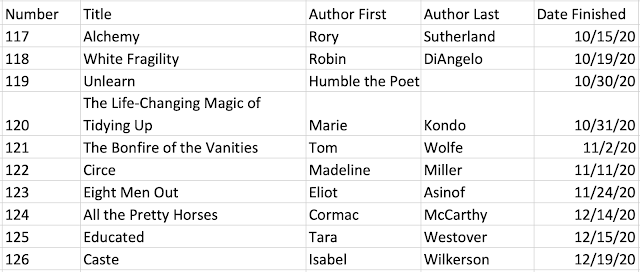Books January 2021 Update
Here are some book reviews from the last couple months:
Alchemy
I flew through Sutherland's audiobook on a long drive. When I reached my destination I almost wanted to keep driving around for another hour so that I could finish it. Sutherland's thesis is that our society would benefit greatly from increasing the amount of non-logical thinking that we do. This applies to business, personal happiness, and all other facets of life. He provides copious examples of how non-logical thinking (not necessarily anti-logical, just "non-sense," as he calls it) has greatly improved lives and examples of how our logic-obsessed culture has failed to do so. There are some problems that can be solved with logic--and should continue to be solved with logical thinking--but there are far more problems which resist being solved with such a method. Despite the obvious resistance of some issues to this way of thinking, we continue to hold logical thinking in the highest regard as we try to apply it to every problem we face. Adding some more non-sensical thinking into our lives will benefit everyone. Highly recommended to anyone who enjoys the popular science genre of reading. If you go for the audio book version like I did, you will also get to enjoy Sutherland's great British voice.
The Bonfire of the Vanities
This Tom Wolfe novel had many of the same characteristics that I enjoyed in his nonfiction books. The foremost of these characteristics is his unique style of writing that makes me feel as if I am one of the characters (the same way he made me feel as if I were on acid in The Electric Kool-Aid Acid Test and as if I were a pilot vying for the top of the imaginary ziggurat in The Right Stuff). He accomplishes this through a rotating omniscient narration, a consistent use of dialect to represent the accents of the various characters, and repetition of single words or phrases that the characters latch onto.
Wolfe's novel follows a cast of characters in 1980's New York. None has a moral compass that is intact or an enjoyable personality. The characters we follow include a Wall Street trader, a state prosecutor, a corrupt community organizer, and a drunk tabloid reporter. While none of the characters are likable, it was fascinating to be in their heads. I found myself somewhat rooting against all of the characters, but they are all pitted against one another in various ways throughout the novel, meaning that at least one of them would have to eventually come out on top. If you like Tom Wolfe's other books, you will like this one; otherwise, it may not be your cup of tea.
The Life-Changing Magic of Tidying Up
I finally got around to listening to this on audiobook after hearing a lot about it for the last many years. Marie Kondo, of course, uses the question "does it spark joy?" to determine if something is worth keeping. I am not ready to dive into her method of an all-out, one-time clean out of everything I own, but I did find some useful tidbits from her book. I am aware that just using some of her ideas is contrary to the technique she dictates, namely to go through everything you own one item at a time in the correct order so as to make sure that you have asked the "joy" question of everything you have. Nevertheless, I am moving forward with my life with a few of her techniques. One bit of information I especially liked is the fallacy she describes of people getting rid of things who want their things to go to a "good home" or to the "right person" who will "use it." If the item in question is not something that sparks joy in you or that you use regularly, it is taking up space and energy in your life, and therefore should be discarded. If someone else can use it, that's great, but holding onto something just because you don't yet have the right recipient does not help anyone. (As a side note, if the item is not useful for you, it is likely not immediately useful for someone else. Not that it could not spark joy in someone else, but it is probably not a life-or-death need for anyone you could think of to give it to). A useful book if you are thinking of downsizing or are feeling overwhelmed by your stuff.
Eight Men Out
This book is a great account of the 1919 Black Sox scandal, the throwing of the World Series by the Chicago White Sox that rocked the baseball world. Asinof has accumulated--through much research--what he claims to be the most complete account of the scandal. This book has been on my sports reading list for a little while; I had heard recommendations of the book from multiple sources this year. I found a copy in my Grandpa Hank's study in November while staying at his house after his passing. It seemed appropriate that the first book I read after his death would be one from his library, so I took the opportunity. This book is a must for baseball fans out there who have an interest in the history of the game.
Caste
There is quite a lot I could say about this book, but I have already discussed it with a book group I am in and do not feel a need to dive far into the details here. The main argument Wilkerson makes is that the United States is and has been since its inception a caste system with White people in the upper caste, Black people in the lower caste, and other races floating somewhere in between. The caste system does everything it can to perpetuate itself, even as laws, demographics, and politics change. The caste system is present in every day of our lives, and we have a lot of collective, difficult work to do to rid ourselves of it. If you are interested in educating yourself (or continuing your education) about anti-racism or the history of Black people in this country, Caste is a great place to start. I encourage you all to read it. I would love to hear your thoughts about the caste system we are part of.
All the Pretty Horses
I am now three-for-three on loving the Cormac McCarthy books that I have read (The Road, No Country for Old Men). I loved the other two, but All the Pretty Horses hooked me the quickest. In less than 10 pages, the descriptive passages were so stunning that I knew I was in for a great read. Here is a short passage from page 5 that follows a one-page narrative about the protagonist John Grady Cole mounting his horse and riding out into the country after his grandfather's funeral:
He rode with the sun coppering his face and the red wind blowing out of the west. He turned south along the old war trail and he rode out to the crest of a low rise and dismounted and dropped the reins and walked out and stood like a man come to the end of something.
The book did not disappoint after the amazing first few pages. All of McCarthy's books have elements of violence in them, but this had the least of the three I have read. The violent episodes in Pretty Horses are fast, raw and wrenching, but they do not overpower the other sentiments of the book. Cole is a peaceful man who loves horses and loves the land and loves to be on a horse riding through the land. I very much enjoyed reading about his journey. Highly recommended if you are looking for your next novel.




Comments
Post a Comment